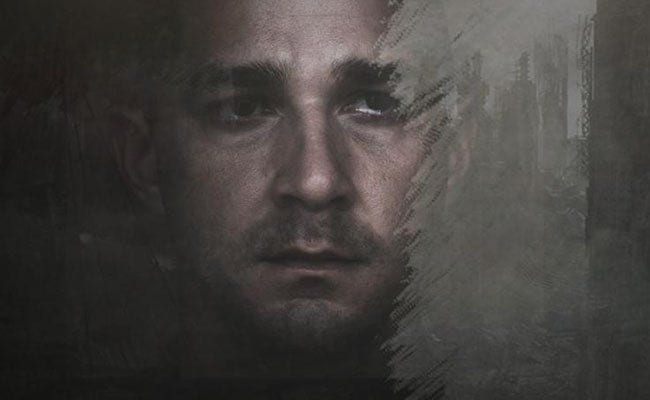
The new psychological drama Man Down doesn’t just try to tug at your heartstrings; it rips them out of your chest and beats them with a bloody sledgehammer. It’s hard to know whether to be angry, frustrated, or depressed after watching director Dito Montiel’s epic miscalculation about the mental toll of war. Thousands of veterans are afflicted by Post-Traumatic Stress Disorder and the psychic scars of combat.
Unfortunately, Man Down fails to find a compelling story to engage this urgent issue. Instead, it undermines the dilemma with lethargic pacing, two-dimensional characters, and a heavy-handedness that borders on insulting.
Gabriel Drummer (Shia LaBeouf) is a mumbling lunk-head who joins the Marines with his “battle buddy” Devin (Jai Courtney) so that they can kick some serious terrorist butt. Hopped up on patriotism and propaganda (Bill O’Reilly makes a weaselly cameo), Gabriel leaves behind his wife (Kate Mara) and young son (Charlie Shotwell) to join the fight in Afghanistan. He returns home from his tour to find that his family is missing and the world he knew has been decimated by a bio-terrorist attack.
Man Down has the dubious distinction of going nowhere in three different directions. Director Dito Montiel (Boulevard, Empire State) employs a non-linear timeline in order to stretch a 30-minute story into a 90-minute film. The first thread takes place in the office of Counselor Peyton (Gary Oldman doing his best with nothing), where Gabriel has been sent to discuss his feelings regarding some tragic “incident”. Substituting therapy sessions for character development has never been pleasing cinematically, but Montiel’s iteration is a sucking vortex of boredom.
The second thread takes place in a post-apocalyptic future. Gabriel prowls the streets looking for his missing family while growing a mangy beard that could shelter several woodland creatures. This CGI cityscape of sawed-off buildings and abandoned warehouses is so cheesy that Snake Plissken wouldn’t be caught dead here. Because Montiel and his screenwriter, Adam G. Simon, have no intention of revealing any details about this world, it’s impossible to care about (or even understand) what’s happening most of the time.
The final thread follows Gabriel in his transition from semi-attentive family man to hardened Marine. Unfortunately, his family life is less than scintillating. There is half-naked canoodling, unconvincing conversation and joking around the dinner table, and occasionally his wife begs him not to enlist. When Gabriel finally gets to basic training, we get the usual montages, including an exercise where the Grunts take a stream of pepper spray directly to the eyes. Again, so little effort is made to invest these scenes with tension that you’re left wondering when the movie is going to start.
Now imagine these three story threads mixed together through seemingly random edits… that’s the backbone of Man Down. The problem is that none of these storylines are particularly interesting. Each is packed with pointless scenes that generate no forward momentum or convey any useful information. On the rare occasion that something exciting does happen, like a percussive firefight in the streets of Kamdesh, the sloppy editing pre-emptively cuts to another dreary buzzkill. Montiel is so intent upon making a “serious” film that his storytelling ends up flatter than LaBeouf’s crewcut.
He also seems hazy on how humans actually talk. Listening to characters talk in Man Down is like watching a television interview that employs a five-second tape delay. Long pauses punctuate every line of dialogue, slowing the pace to a painful crawl. Nowhere is this more evident than the relationship between Gabriel and his wife. LaBeouf and Mara are both capable actors, but their stilted dialogue kills any potential chemistry.
Oldman, too, is hampered by the dialogue, as he and LaBeouf must communicate through a series of monosyllabic grunts and empty platitudes. More importantly, no one can reveal anything about the plot. Montiel has a big twist waiting in the final 15-minutes, so he’s content to twiddle his thumbs for the first 75.
It comes as no surprise, then, when the final twist feels completely disconnected from the film you’ve been watching. Minus three-dimensional characters and tension-filled scenes, this shocking conclusion comes across as manipulative and saccharine. Montiel goes so far as to superimpose images on top of each other, just in case you aren’t sure which emotions are appropriate for the moment. This lack of subtlety and craft inadvertently cheapens a subject that desperately calls for thoughtful examination.
Calling Man Down a cynical film is, perhaps, a bit too harsh. Yes, there’s blatant product placement throughout, and the wacky conclusion feels more like a grab for the wallet than a punch to the gut, but everyone seems genuinely interested in the plight of wounded veterans. Innumerable lives and families are destroyed by the silent killer that is mental illness. It’s a shame, then, that Man Down tackles this monumental problem, only to fail as both entertainment and as a conversation starter.


![Call for Papers: All Things Reconsidered [MUSIC] May-August 2024](https://www.popmatters.com/wp-content/uploads/2024/04/all-things-reconsidered-call-music-may-2024-720x380.jpg)



